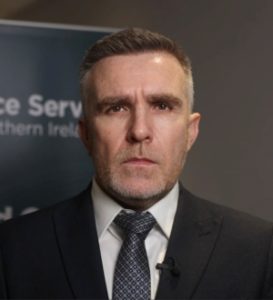Creating the space for communities to thrive: an interview with PCTF Chief Superintendent Andy Hill
Detective Chief Superintendent Andy Hill is the Police Service lead for the Paramilitary Crime Task Force (PCTF). We caught up with him recently to discuss the work of the PCTF, its fit within the wider Programme and the benefits of the unique partnership structure of the Task Force.

The Task Force’s approach
“We are equal partners in the PCTF and being co-located with the National Crime Agency (NCA) and His Majesty’s Revenue and Customs (HMRC) brings a different mind-set and a range of benefits. HMRC have additional powers around excise and access to international partners. In addition to specialist skills and capabilities, the NCA also bring not only specialist capabilities and international reach but also beneficial powers of civil and asset recovery.
“I’m proud of the work that PCTF have done and we have had a number of significant successes. Taking guns off the street is great in the here and now, but it also means that we are preventing future victims from harm. After those results, the community feedback has been really heartening; people have felt a positive difference.
“However, there is only so much that we can do. To do this we conducted a strategic assessment and this has identified the top six groups in terms of threat, harm and risk that are the focus of the PCTF.
“We are focused in on the most acute harm perpetrated by these six gangs, but we cannot arrest our way out of this issue. We need a whole system approach to not only deal with the hidden harms such as coercion and intimidation, but to address some of the underlying issues. We want communities to feel confident enough to say ‘we don’t tolerate paramilitarism’. That’s why promoting the role of PCTF is important in saying, ‘this is what we do, this is what task was set for us and this is what we have achieved so far, but we’re not going to arrest our way out of this’. It is a problem for the whole of society to address.”
Working with the wider Tackling Paramilitarism Programme
“We cannot do this alone and we’re keen to deepen our work with partners on things like information sharing and early intervention work. By closer working with partners I feel it can help us all understand, not just those incidents being reported to police, but what goes on that people don’t want to report to police, to make sure that we’re focussing our work in the right places.
“Our aim is to tackle the threat from paramilitaries and create the space for community resilience functions, including Neighbourhood Policing, and the work funded by the wider Tackling Paramilitarism Programme to then build community resilience and reduce the space for these groups to operate in communities.
“The Police Service Crime Prevention and Early Intervention Branch also operate a Community Safety project to support relevant initiatives. My role within the Police Service also includes considering applications for relevant funding. This means that we can ensure that the work of the PCTF and our Community Safety projects are aligned and using the available Programme data and insight to identify areas of greatest need.”
The importance of data and analysis
“The wider Tackling Paramilitarism Programme is data and insight led, and we play our part in that. For example, recent analysis about paramilitary attacks has helped us understand more about the victims of violent attacks and intimidations. We then take that insight and map it across both our prevention and enforcement work, to make sure it aligns with our understanding of victims. It lets us bring all of those things together.”
A personal reflection…
“I attended Monkstown Boxing Club recently with the Programme Sponsor Group. I spoke to some young people and heard their stories about how the Tackling Paramilitarism Programme had created a safer space for them, and that they now wanted to go into a range of professions. What that tells me is that despite living in an area that has a paramilitary group influence, the PCTF has helped to create that safer space that then enables community projects to flourish. We are making a difference.”
